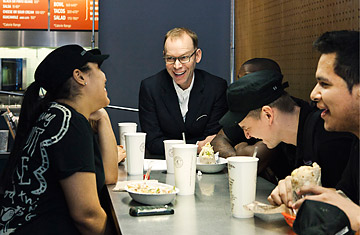
Steve Ells in New York City with Chipotle employees, who are hired based on 13 characteristics, four of which basically mean happy.
(4 of 6)
Twelve years ago, Ells found something else scary. He was unhappy with the quality of Chipotle's pork, which almost nobody was buying. He found a better product that cost so much more, it forced Chipotle to raise the price of carnitas burritos by a dollar, but it also increased them to about 8% of sales. Far more important to his company's future, Ells got freaked out when he saw the pig-confinement lots used by the supplier that had been providing Chipotle's pork. So he started buying free-range pork from Niman Ranch and came to believe that his goal of serving fresh food that tastes good was linked to ethically sourcing the ingredients. Chipotle is now the largest restaurant buyer--purchasing nearly 100 million lb. in 2011--of naturally raised meat, which the company defines on its website as coming from animals "raised in a humane way, fed a vegetarian diet, never given hormones and allowed to display their natural tendencies." Having trademarked such phrases as "Food with integrity" and "Fresh is not enough anymore," Chipotle last year released an animated ad, in which a farmer industrializes his operation, feels guilty and transforms his farm into one more akin to those found in children's books. The ad won a Grand Clio, pissed off industrial farmers and made it clear that Chipotle is selling not just food but an ethos.
Chipotle uses locally grown produce whenever possible. It bought some 10 million pounds of the stuff last year. The company also tries to use not merely organic beans but no-till ones, which do less damage to the soil. In June the company reached another milestone: 100% of its sour cream--and 65% of its cheese--now comes from pasture-raised cows. Although Chipotle has helped grow the market for poultry that isn't loaded with antibiotics and beef that doesn't come pumped up with growth hormones, the supply doesn't always meet the demand, and the chain lets customers know if it has to fill in the gaps with conventionally produced meat. But even as some market watchers remain wary of the company's stock, in part because of higher ingredient costs, Ells has been praised by sustainability maven Wes Jackson, animal-rights philosopher Peter Singer and novelist and vegetarian advocate Jonathan Safran Foer, who is in talks to write short pieces that would appear on Chipotle bags and boxes. Chief marketing officer Mark Crumpacker--who, like co-CEO Moran, went to college with Ells--says relatively few customers are aware of the chain's ecological and animal-welfare efforts. He figures "conscientious eaters" make up about 30% of Chipotle's patrons. "It's growing. I don't know what it was 10 years ago. I'm guessing zero. Will it be 60% in five years? I hope so."
A Whole New Menu
If Ells is going to change the way Americans eat, he knows they can't eat burritos every day. So he finally wants to introduce completely new dishes. And just as he thinks it's weird for a burger joint to suddenly serve fish sandwiches, fried chicken and barbecued ribs, he's decided to sell his new items at a new restaurant. Not a high-end one like he once dreamed of, but one more like Chipotle that can affect millions of people.
